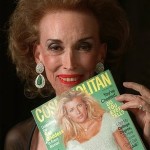Sex and the Single Girl: Remembering Helen Gurley Brown
Helen Gurley-Brown, the doyenne of the cleavage-bearing, sex-obsessed young woman, passed away last week at the age of 90. Gurley Brown, who served as editor-in-chief of Cosmopolitan magazine for more than 30 years, was the author of 9 books (including Sex and the Single Girl and The Late Show: A Semi Wild but Practical Guide for Women Over 50), most of them targeted to the sexually liberated woman. She also recorded the album Lessons in Love. Born into poverty in Green Forest, Arkansas, she bombed in some 17 mostly secretarial jobs before writing Sex and the Single Girl at the age of 40, taking the helm of Cosmo and becoming the thoroughly modern, quintessentially high-profile New York professional woman. 
I had the pleasure of meeting Ms. Gurley Brown at the beginning of my nonprofit career, when the agency I was working for honored her. When I called her office to ask her if she had any specific dietary needs for the awards evening, she chirped merrily: “Absolutely not! I’ll eat what everyone else is eating!” She was charming, cheerful, and unlike many of the honorees I was to meet later on in my career, completely no-fuss.
On the evening of the awards, which Gurley Brown attended accompanied by her elegant husband of 51 years, movie producer David Brown, she chatted gregariously (and flirted mightily) with the handsome senior staff member assigned to her table—while rearranging the food on her plate. When her name was called from the podium, she sprung to her feet, trotted to the stage and then literally leapt on it, smiling broadly; a septuagenarian sprite. I don’t remember her words that night, but I do remember the tiny figure who dazzled the room and whose iconic status didn’t disappoint.
Gurley Brown adeptly shook off the criticism of feminists, who labeled her and her Cosmo girl as throwbacks to another age. One could argue that by clawing her way out of poverty and what could have been a lifetime of dead-end secretarial jobs to achieve international acclaim, she did it her way, and that is feminism enough. Rest in peace, Helen Gurley Brown. Well done.

You must be logged in to post a comment.